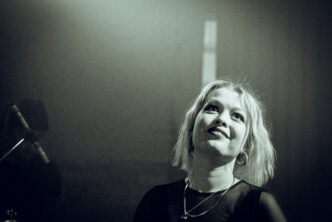Music in Mind is Manchester Camerata’s pioneering music therapy project for people with dementia. Carmel Thomason talks to musician, Naomi Atherton to find out how the programme has adapted online during the pandemic, providing emergency relief from isolation for people with dementia in care homes across Greater Manchester.

Can you tell us about the Music in Mind: Remote dementia programme?
Naomi: “Manchester Camerata has been running their Music in Mind sessions in care homes all over Manchester since 2012. Orchestral musicians work alongside a Music Therapist making music which is mainly improvisatory. This is designed to give people with dementia the chance to communicate and interact with others through music making, particularly for people with limited verbal skills. Participants are given time to respond to the music and are supported in making their own creative decisions, e.g. what instrument to play, when to play it, and how this relates to the rest of the group.
“We also run an extensive training programme for care staff so that they’re able to continue the sessions once the project had ended”.
How does the programme work online?
Naomi: “As we aren’t able to go into care homes at the moment and it wouldn’t work for us to deliver sessions over Zoom, we’ve created a complete online course for care staff. It covers the techniques we use to facilitate music making with people with dementia. This means that care staff can run music sessions and keep the continuity going until were are able to resume our visits.
“We partner the online resource with fortnightly group Zoom catch-ups, looking in more depth at aspects of the course. As everyone’s circumstances are different we also have one-to-one Zoom calls where we can help with more specific questions”.
Why do you think the programme has been so successful?
Naomi: “Because it works! One of the things I’ve always loved about being a musician is seeing how music can affect the mood of the music makers and the listeners. It’s sociable, fun and makes you feel part of something. All this without using the spoken word! Music in Mind works in a similar way. It gives people with dementia a voice and a sense of community in the moment. It focuses on what you can do rather than what you can’t”.
What is your role?
Naomi: “In the orchestra I play French Horn. It has a mellow sound, much like the human voice. Generally people respond to it really well, although I’m always careful to start playing really gently. So far no one has objected to the noise!
“Because we try to improvise as much as possible – supporting, copying, using music to have a chat, you’re just as likely to find me playing a shaker or a drum or singing and dancing along as playing the horn.
“I feel my role is to work with the Music Therapist and be an extra pair of eyes and ears – looking and listening out for musical ideas and helping to bring the group conversation together with my playing”.
The programme showed an increase in 90% of the participants’ social, communication and musical skills, and in their mood. There was also a decrease in their levels of anxiety, frustration, repetitive behaviour and agitation”.
Naomi Atherton
How do people with dementia respond to the sessions?
Naomi: “Everyone is different and have such varied needs, so all the participants in our project responded in their own individual way. The research that was carried out in parallel to the Music in Mind programme showed that by week four of the project, there was an increase in 90% of the participants’ social, communication and musical skills, and in their mood. There was also a decrease in their levels of anxiety, frustration, repetitive behaviour and agitation”.
You have travelled around the world with the programme, what has been the response in other countries?
Naomi: “Very positive. It confirmed to me that music really is a universal language. As an example: we worked in a care home in Japan. We started with a hello song which we had learnt in Japanese, but after that we only spoke through the music, playing instruments and improvising for over an hour. The session worked in exactly the same way as it would in the UK. We didn’t need words and at the end everyone was smiling.
What differences have you noticed between doing the sessions online and face-to-face?
Naomi: “When we talk face to face we don’t realise how much of our communication is through facial expressions, hand and body gestures and eye contact. These things tend to get lost when you’re online so we needed to be creative and find other ways of working which is how we came up with the online teaching resource.
“We filmed lots of footage to give examples of the techniques we use and also recorded lots of music to play along to. Being online has highlighted how difficult many of the care staff are finding things during the pandemic. I feel we have a duty to support them just as much as we need to support the residents”.
What plans do you have for the future of the programme?
Naomi: “We’re really looking forward to being able to go back to the care homes in person as soon as we can. Some really good things have come out of having to do all our work online though and we’ll blend our new teaching resource into our training sessions. It also means we can offer training anywhere in the world”.
How can people find out more, and how can care homes introduce more music therapy for residents with dementia?
Naomi: “Music therapy for residents can come in lots of different forms, from passive listening to music, to active participation playing and creating music. A simple way to introduce more music for residents is to create individual playlists of music that they like or react well to. Another simple way is buying a few easy to play instruments such as tambourines, maracas and encourage residents to play along to music. Playing instruments in musical conversation is a little trickier to get to grips with, which is why we’ve created this training, but we think it’s really important because it allows people with dementia to express their own emotions through music, rather than playing along to a song.
“People can find out more by visiting the Camerata in the Community website which briefly outlines the programme and shows some video examples of how we work with people with dementia. You can email us if you want to ask anything specific or to get involved with us”.
Visit the Manchester Camerata website for more details.





